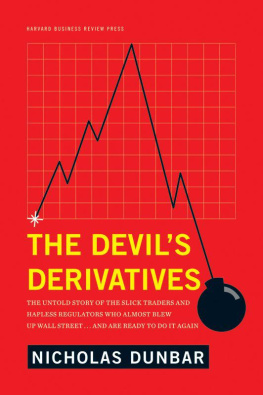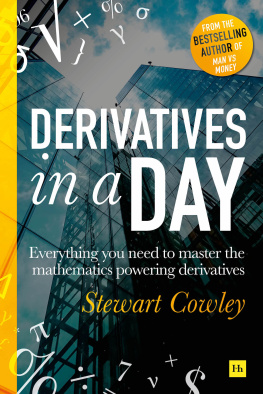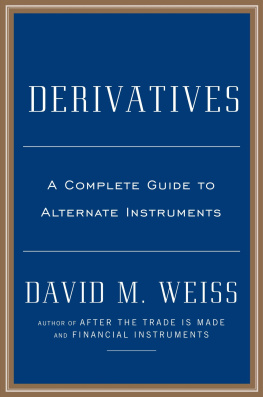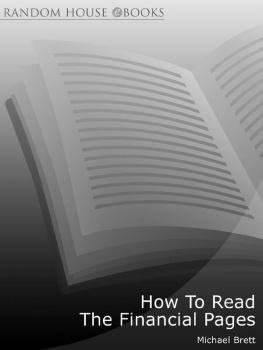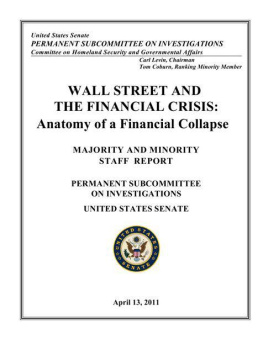
Copyright 2011 Nicholas Dunbar
All rights reserved
No part of this publication may be reproduced, stored in or introduced into a retrieval system, or transmitted, in any form, or by any means (electronic, mechanical, photocopying, recording, or otherwise), without the prior permission of the publisher. Requests for permission should be directed to , or mailed to Permissions, Harvard Business School Publishing, 60 Harvard Way, Boston, Massachusetts 02163.
First eBook Edition: July 2011
ISBN: 978-1-4221-7781-5
For T
Contents
|
| Introduction to derivatives. Long-term actuarial approach versus the market approach to credit. Goldman Sachs sees opportunity in default swaps. The market approach vindicated by Enrons bankruptcy. |
| The advent of VAR and OTC derivatives. The collapse of Long-Term Capital Management (LTCM). A fatal flaw is exposed. The wrong lesson is learned. |
| A new market for collaterized debt obligations (CDOs). Risky investments, diversification, and the role of the ratings agencies. Barclays finds investors for its CDOs, only to fall out with them. |
| J.P. Morgan and Deutsche Bank dominate the European CDO market. Innovation outpaces the ratings agencies. Traders make millions with the help of correlation models. Reasons for concern. |
| The Fed lessens the restraints on big banks. Regulators are unable to keep pace. Banks abuse the system. Government agencies miss the chance to rein in the abuses. |
| A boom in the demand for CDOs. Subprime bonds and a new kind of default swap help feed the demand. Housing bubble begins to burst. Dealers bet against their own deals. |
| The secret history of shadow banking. Cash gets subverted by subprime. Ratings agencies jump on the structured investment vehicle (SIV) bandwagon. Skittish investors flee the market. |
A flood of toxic assets undermines confidence in the market-based system. Goldman Sachs takes advantage. Investors bet on the collapse of the banks. Disaster is imminent. Governments prop up the system.
|
What follows represents my interpretation of and commentary on events based on my long experience in the field of financial journalism. The views that I have reached and set out in this book are my own, and I have come to them based on my impressions from the people whom I have spoken to and the documents that I have reviewed.
It is safer to be a speculator than an investor... a speculator is one who runs risks of which he is aware and an investor is one who runs risks of which he is unaware.
John Maynard Keynes
On a chilly winters evening in 2003, I went out to an exclusive nightclub in Londons Knightsbridge district favored by bankers and hedge fund managers. My senses were assaulted by thumping dance music as I followed my friend who was weaving across a dance floor thronged with leggy Russian blondes and the men who love them. There were acquaintances under the strobe lights: I spotted the global head of interest rate trading at a big German bank shimmying up against a pair of microskirted brunettes who towered over him. We then went up some steps and came to the closed door of the VIP loungewhich had its own doorman. The door swung open and we continued our way to a low-ceilinged room, the VIP lounge within the VIP lounge. There, sprawled across low sofas and thick cushions were bankers celebrating their annual bacchanal, which is also known as bonus season.
There were a few Brits and Americans there, but most of the revelers were continental Europeans wearing well-cut Italian suits and well-pressed dress shirts, with their Hermes ties long ago cast to the winds. They either sipped 30 whisky sours or topped off their glasses from 400 bottles of Belvedere vodka. This was London before the smoking ban, and the glowing tips of cigarettes could be seen tracing formulas in the air as bankers sketched out the key details of their wildly successful deals for one another. I knew about some of them: there was the head of financial institutions derivatives marketing who forgot which of his Italian supercars had been towed off to the car pound. There was the head of credit structuring notorious for preying on female staff and having his corporate credit cards stolen by prostitutes. These young menand almost all of them were young, some shockingly sowere the avant-garde of the credit derivatives boom, enjoying their first, fifth, or tenth million; outside the door of the VIP lounge, the Eastern European blondes were waiting to pounce on them.
There are many sobriquets for these young lions, but I like to think of them as the men who love to win.
The Moneymaking Gene
In London and New Yorkthe twin cities of financethe bonus season was big business for many people, and at Christmas, the streets tingled with money being splashed around. I had grown up in both cities, at a time when they were still postindustrial. In my youth, enclaves like London and New Yorks SoHo districts were edgy places that still had the brio of bohemian excitement, but in the past twenty years, those dingy streets had become dazzlingly clean and new. The bankers and hedge fund managers had arrived, bringing with them obscenely bloated annual bonuses, finely crafted automobiles, and their exhaustively renovated offices, homes, and wives.
In the early 1980s, the United States and the United Kingdom produced most of their wealth by manufacturing. A decade laterthe financial services industry was dominant. In the United Kingdom, the sector contributed a quarter of all tax revenues and employed a million people. The business of making money was a very big business indeed. By the 1990s, the City and Wall Street had become the engines of the economy, sucking investments in from all over the world, then feeding credit to the masses and helping them pump that money through Main Street, High Street, and a million suburban shopping malls. The money thrown off by this engine did not just pay for the bankers smart houses but benefited many other workers, such as architects, nannies, personal trainers, and chefs. The taxes skimmed off allowed politicians to claim credit for further largesse, to be enjoyed by a vast constituency of teachers, nurses, soldiers, and so on.
The transformation of New York City and London went far deeper than the upgrading of neighborhoods, the steep increase in property values, and the proliferation of boutiques stocked with overpriced merchandise. The value of financial assets held by banks, hedge funds, and other institutions had far outstripped the actual producing power of the U.S. and U.K. economies, and could be measured in multiples of gross domestic product (GDP). The nearly unfathomable wealth these people generatedand pocketedfundamentally and irrevocably changed the worlds financial system, and very nearly destroyed it.
To truly understand what brought on the great financial meltdown of 2008 requires a thorough understanding of the men who love to win, and how they came to fundamentally change not just the practices of a financial system that had been in place for centuries, but its very DNA.
This rare, often admirable, but ultimately dangerous breed of financier isnt wired like the rest of us. Normal people are constitutionally, genetically, down-to-their-bones risk averse: they hate to lose money. The pain of dropping $10 at the casino craps table far outweighs the pleasure of winning $10 on a throw of the dice. Give these people responsibility for decisions at small banks or insurance companies, and their risk-averse nature carries over quite naturally to their professional judgment. For most of its history, our financial system was built on the stolid, cautious decisions of bankers, the

